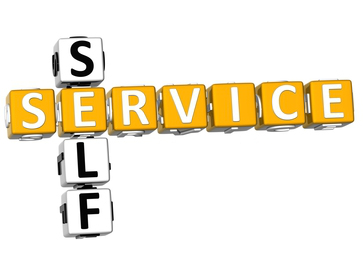
10 Apr Self-service, client experience and the trusted advisor
“How’s you day going?”
“Lovely weather isn’t it?”
“That’s a nice shirt”
“Did you see the footy last might?”
Having to navigate retail checkouts and the well-intentioned efforts of various staff to improve the customer experience by building rapport can be extremely tiresome at times.
I had a dreadful experience last week at a retail outlet that I won’t name to save some embarrassment: I was having a perfectly nice time with a junior staff member but we got to a point where he couldn’t help me. He told me what he could do, told me what he couldn’t do. This was fair enough but I must have looked a bit dissatisfied so he called his manager in who’d obviously just graduated from some no-doubt-expensive client experience training. She sat me down, offered me coffee and tried every trick in the book to build rapport – obviously Giles from Buffy came up – and we wasted 10 minutes going absolutely nowhere.
She wasted my precious time all for the sake of trying (and failing) to build some sort of relationship with me.
This is one of the reasons why self-service is one of the – if not the single -fastest growing trend in customer experience. People increasingly know (or think they know) what they want and just want to buy and get out with out any additional time costs or demands on their limited reserves of energy or goodwill towards humanity. For many poeple, especially but by no means exclusively the younger generations, excellent service is easy, quick and impersonal.
Self-service is a relatively recent phenomenon in service history, starting with bank ATMs, encompassing self-scanning aisles at supermarkets and then pretty much everything else as people discovered the joys of the interweb and related technologies. It’s not for everyone of course, and it can be taken too far: even I occasionally crave some human interaction having been led through various “press option 1, for . . . . “levels by Vodafone.
Self-service and legal practice
So where does this leave lawyers?
The most obvious development is the increasing number of online fixed-scope legal services, where your legal needs can be serviced after the completion of simple online questionnaires. Risk/quality issues aside, this is very attractive to a significant chunk of legal consumers: no painful sessions with lawyers desperately trying to understand your needs, just press a few buttons at any time of day or night, enter your paypal password and voila! – your legal needs can be met with minimal time costs.
Even beyond the online model (many of which require clients actually talk to a lawyer at some stage), clients are increasingly demanding that legal services are provided with lower client time cost, less hassle and more convenience. As clients increasingly buy on a best-of-breed basis, clients see any purchase of legal services as one-off transactions – so there is minimal value in developing a relationship.
Legal practices cannot ignore this trend. They should look to make the provision of legal services as easy as possible – with guidance videos and documents, pre-interview online forms and out-of-hours skype interviews amongst other initiatives.
Service demands are only going to increase and as they do, consumers will only get increasingly frustrated with law practices who insist that clients come into the law practice itself (not skype even!) for long client interviews.
The trusted advisor model
So, what can law practices do?
The first thing to say is that this isn’t the end of the trusted advisor model and relationship value. Although more people are favouring the self-service approach, legal services can be complicated and many people will still value the reassurance of personal contact – for ongoing work and even discrete instructions.
But please don’t take that as an excuse to be complacent – it’s gonna get harder!
Too many law practices and individual lawyers think relationship value is created, and that trusted advisor status naturally follows, simply by being in the same room as clients. It doesn’t. Building relationship value is hard and getting harder.
- As clients get more time-conscious, you have to work harder to justify why they should spend their time meeting with you. What’s in it for them? Where’s the value?
- If you spend both your time and theirs on getting to understand their needs, you have to ensure – more than 95% of the time – that this understanding translates into legal, commercial or personal value (otherwise you’ve just wasted their time).
If you persist with the trusted advisor / relationship value model, you have to make sure it delivers added value – and that’s tricky when clients expect so much as standard – yesterday! If you are not delivering added value through your approach, there are lower-investment alternatives around for clients to opt for.
Crapport
Building rapport can be a powerful when it works. Rapport can build trust, enhance communication, reduce sales / price resistance and can make the whole engagement easier and more rewarding for all involved.
But resistance to rapport-building techniques is growing as people either use simplistic techniques poorly or over-use them. If you try to force feed rapport-building techniques on a time-conscious, low-energy introvert, it can often be painful. The use of NLP and more subtle techniques ( a silent smile?) can work wonders but sometimes the biggest skill is in learning when you need to back off the rapport building and just get on with it.
Register now for ‘Delivering a totally awesome customer experience’, Brisbane, 13 July.



Sorry, the comment form is closed at this time.